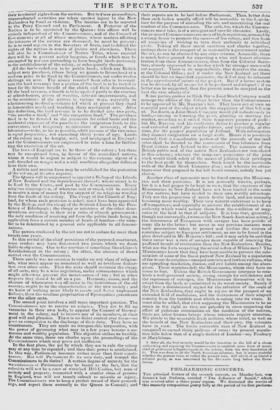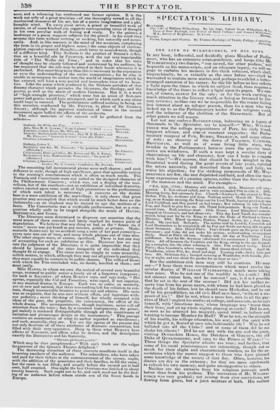PHILHARMONIC CONCERTS.
TIIE principal feature of the seventh concert, on Monday last, Wall Semites lust Sinfunia, entitled " The Influence of Sound," which was revived after a three.years• repose. We discussed the merits of this masterly composition pretty fully at the period of its first perform.
ance, and a rehearing has confirmed our former opinion. It is the work not only of a great musician--of one thoroughly versed in all the. mechanical resources of his art, but of a poetic imagination and a phi- losophic mind. To every great artist, a grand or beautiful work of nature, or of some kindred art, suggests corresponding turns of thought
in his own peculiar walk of feeling tied study. To the painter, a landscape or a poem suggests subjects for the pencil; in his mind they assume this form without striving or seeking, but naturally and neces- sarily. Ana, in like manner, ill the mind of the musician, (employing the term in its proper and highest sense,) the same objects of contem- plation engender musical thoughts—each turns to nourishment, though of a different kind. This Sinfonia is the product of SPOHICS rt flee- lion on a beautiful ode by PFEIFFER, with the not very translatable title of " Per Weihe der Tune ; " and in order that his train of thought may be clearly followed and understood by his auditors, he has requested that the ode may be placed in their hands whenever it is performed. But something more than this is necessary to the enjoyment or even the understanding of the entire composition ; for he who is unable to accompany its author into the world of imagination which he Las entered, will have a very partial and incomplete view of its beau- ties. Like the poem which produced it, the Sinfonia partakes of that dreamy character which pervades the literature, the theology, and the poetry, as well as the music of modern Germany. But it is a work of "high-wrought phantasy," which none but an artist of first-rate power and genius would have attempted, and in which such a one alone could hope to succeed. The performance suffered nothing in being, on this occasion, conducted by Mr. POTTER, in place of Sir GEORGE SMART; although the apparent confusion of times in the second movement again baffled the efforts of the orchestra. The other materials of the concert will be gathered from the scheme—
SPOHR. SACCHINI.
MULLER.
MOZART. BEE ruorm
PART Sinfonia, Letter V. HAYDN. Recitative and Air, Mr. PHILLtrs, "Ye guardian Saints"
(Palestine) Dr. CROTCH. Coacertante, Flute and Oboe, Mr. R la AS and Mr. A. Maas HIRAS.
Recitative ett Aria, Mademoiselle Senators:v., " Da quel di"
(*Om i..) DONIZETTI. Overture, (elartereun) CRERUDINI. 1.40Aller, Mr. COOKE—Conductor, Mr. POTTER.
The remaining full instrumental pieces were well chosen ; and each different in style, though of high excellence, gave that agreeable variety to the evening's entertainment which it often so much needs. The Fantasia and Concertante were not suited to the designed character of the Philharmonic Concerts ; which was, not a display of the mar- vellous, but of the excellent—not an exhibition of individual dexterity, unless exerted upon some work of high pretensions in the performance of which such talent is necessary. A concerto on the double bass is a mere exhibition of the marvellous : it only shows that great
practice may accomplish that which would be much better done on the violoncello—as an elephant may be trained to ape the motions of a fawn. The Concertante was a creditable performance,. but as a com- position wholly unfit to be ranged alongside the music of HAYDN, BEETHOVEN, and SPOHR.
The Directors seem determined to disprove our assertion that the vocal music of these concerts had lately reached its lowest point of degradation. We believe that any thing so bad as the " Soave sits ii vento" never was yet heard at any concert, public or private. Made- moiselle SCHRICKEL by no accident sung a note of her part correctly-- every note was out of tune, and many whole phrases out of time also. The other singers were, of course, sacrificed. There is but one way of accounting for such an exhibition as this. However low we may rate the judgment of the Directors, it is quite impossible that they should be ignorant of the utter incapacity of the individual they thought fit to engage. The cause must be sought in some unworthy, selfish motive, in which, although they may not all privately participate, they must equally be content to be public sharers. The volley of hisses with which the 'Trio concluded was, no doubt, levelled at them ; and most justly. Miss Hawes, to whom we owe the revival of several very beautiful songs, restored to public notice a lovely air of a forgotten composer ; for such is SACCIIINI; of whom BURNEY says, and says truly, " His operas, especially the Cid and Tanterlano, were equal, if not superior, to any musical dramas in Europe. Each was so entire, so masterly, yet so new and natural, that there was nothing left for criticism to cen- sure, though innumerable beauties to point out and admire. His taste was so exquisite, that he was new without effort, and ingenious with- out pedantry ; never thinking of himself, but wholly occupied with ideas of the poet, the propriety, the consistency, the effect of the whole drama. His accompaniments, though ingenious, never call off attention from the voice ; but, by a constant transparency, the princi- pal melody is rendered distinguishable through all the contrivance of imitation and picturesque design in the instruments." This passage contains an enumeration of what its author regarded as excellences ; and such, assuredly, they are. Yet are the operas of the present day not only destitute of all these attributes of dramatic composition, but filled with their very opposites. Deny to them what BURNEY here affirms of' SACCHINI, and affirm what he denies, and the description exactly fits DONIZETTI and his fraternity.
e Ins nom plebecula gantlet."
Which may be thus paraphrased.—" With such trash are the vulgar frequenters of the Queen's Theatre delighted."
The decreasing attraction of these concerts manifests itself in the lessening numbers of the audience. The subscribers, who have taken and paid for their tickets at the commencement of the season, ought, with the addition of the associates and their families, to fill the room ; but the room is not filled ; and usually before the second act is half over, half emptied. One night the last Overture was finished to about twenty hearers. Such ought not to be, and such need not be the feel- ing of an audience before whom stands one of the finest bands in Europe.
PART I.
Sinfonia. Die der 'rine Aria, Miss M. IL I AWIS, Tergi ii ;dant° " (Cresu) Fantasia, Contra Basso, Mr. MULLER Terzotto, SCIIRICKEI , alba: M. B. Ilawss, and Mr. Pit t.1,1 p, " t-,txtve sia ii unto" (Cod fins Tutte)
Overture, (Leonora)



























 Previous page
Previous page